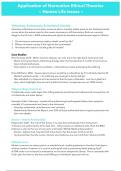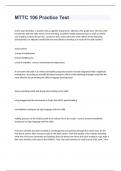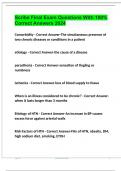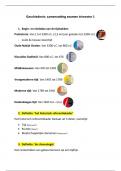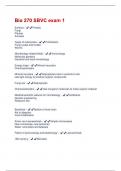~ Human Life Issues ~
Voluntary Euthanasia & Assisted Suicide
Voluntary euthanasia occurs when someone who is mentally stable wants to die. Assisted suicide
occurs when the patient asks for the means necessary to kill themselves. Both are currently
illegal in the UK, but in 2002 euthanasia and physician-assisted suicide became legal in Holland.
1. Do we have an autonomous right to death as well as life?
2. Effects on human society if the right to die is permitted
3. Are those who assist in suicide guilty of murder?
Case Studies
Noel Canway, 2018 - Motor-neurone disease, can only move his right hand, head and neck
- Wants to be prescribed a lethal drug dosage when he has less than 6 months to live but has
been refused euthanasia
- Only option is to remove his ventilator - extraordinary means prolonging his suffering
David Williams, 2006 - Severe spine tumour, would be in wheelchair by 37 and likely dead at 40
- Wanted assisted suicide -> his suffering was causing his family distress
- Was admitted to a hospice and recovered so that the pain is bearable - now he is glad he is
alive, which highlights how we can’t predict the future / prognoses are not 100% certain
Slippery Slope Argument
If euthanasia were made legal, then killing patients would become habitual and increase the risk
of infanticide and other abuse.
Example: Hitler’s Germany - started off as euthanising handicapped babies, then spread to
mentally ill, homosexuals and Jews in the Holocaust.
- Voluntary euthanasia could become non-voluntary
- Netherlands, Remmenlink Report: over 50% of those euthanised had not given permission for
their own deaths
Doctor / Patient Relationship
Hippocratic Oath - the role of the doctor is to save lives and abstain from doing harm
‘If doctors are authorised to kill or help kill […] they acquire an additional role which the BMA
believes is alien to the one of care giver and healer’ (British Medical Association)
- Doctor / patient trust may diminish if the doctor has the power to kill or let die
- ‘A paranoid fear that the nurses, doctors and medicines are out to kill them’ (Antony Smith)
Palliative Care
Modern science can reduce pain to a tolerable level, enabling patients to live their final days in
relative comfort. However, is it cruel to prolong life and is preventing death playing God?
A DNR order is not classed as euthanasia and must be obeyed the doctor. This is consistent with
God’s plan for them to die then and fulfilling an individual’s personal will too.
, Application of Normative Theories
Natural Moral Law
Aquinas rejected any form of euthanasia or suicide as:
1. Life is God’s gift to humans -> subject to His power
2. Suicide is against the natural inclination of any life form to stay alive
3. Conflicts with Primary Precepts: preservation of life, worship God, live in an ordered society
4. 1980 Declaration of Euthanasia (Catholic Church)
- Euthanasia ignores the value of suffering -> salvation (link to Jesus’ suffering on the cross)
5. Against the Sanctity of Life
6. Disrespects God’s creation and Divine Will
- Life is a gift from God and destroying one’s life is analogous to stealing
7. However: ‘thou shalt not kill, but needs not strive officiously to keep alive’ (Arthur Clough)
Doctrine of Double Effect
Application to euthanasia e.g. large morphine dosage
1. Intention = pain relief / reduce suffering -> compassionate
2. Side effect (unintentional outcome) = death
Aquinas approves of this as relieving pain is a good act (deontological). For the act to be good,
the intention must be good i.e. the intention behind giving someone a large morphine dosage
must not be to kill, but to relieve suffering.
However: Our true intentions are not known by others and some people are fallible.
- e.g. some may not intend to alleviate suffering but rather receive inheritance money from
their late parents -> reflects vice of greed
Voluntary Euthanasia as Suicide
‘Rational suicide’ = self-contradictory
Spinoza: suicide goes against the drive to survive in human nature -> never rational or free
Freud: suicide is a symptom of psychological dysfunction -> not a rational action
Proportionalism
Maguire - ‘We are bound to respect life but not to prolong it in every circumstance’
- Rejects idea that humans are God’s property
- Rejects that interference with God’s plan is impermissible (medicine would then be immoral)
- No difference between ending and preserving life as both interfere with God’s plan
- Human dominion over life and death is underestimated / humans can choose good
- However: all extraordinary means could be seen as playing God (even preservation of life)
Curran
- Sanctity of Life and respect for life is a moral imperative
- However: the dying process shows that life has reached its limited -> euthanasia is not
contrary to respect for life
- Human Dominion - ‘man does have some dominion over the dying process’
- Only acceptable when dying process has already begun and must consider quality of life

